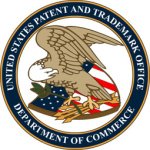- Industria: Legal services
- Number of terms: 3815
- Number of blossaries: 0
- Company Profile:
one type of depiction of the mark sought to be registered. Another name for this type of mark is “special form.” If the mark includes a particular style of lettering, or a design or logo, the mark is considered to be stylized or in special form. Therefore, applicants must select the "stylized or special form" mark format when applying for these types of marks. The representation of the mark's page should show a black and white image of the mark, no larger than 3.5 inches by 3.5 inches (8 cm by 8 cm). The mark in special form must be a substantially exact representation of the mark as it appears on the specimen or on the foreign registration, as appropriate.
Industry:Legal services
Original is used in the patent statute and rules to refer to an application which is not a reissue application. An original application may be a first filing or a continuing application.
provides secure access for customers who want to view current patent application status electronically via the Internet
Industry:Legal services
SB is used today as part of the label in our form designations (e.g., PTO/SB/05 ). The origin of this notation is a Specimen Book (no longer in use) that included all of the forms.
Industry:Legal services
secondary trademark register for the USPTO. It allows for registration of certain marks that are not eligible for registration on the Principal Register, but are capable of distinguishing an applicant’s goods or services. Marks registered on the Supplemental Register receive protection from conflicting marks and other protections, but are excluded from receiving the advantages of certain sections of the Trademark Act of 1946. The excluded sections are listed in 15 U.S.C. §1094.
If the applicant seeks registration on the Supplemental Register, the application should state that registration is requested on the Supplemental Register. If no register is specified, the Office will presume that the applicant seeks registration on the Principal Register. To register a mark on the Supplemental Register, applicants must either be using the mark or filing under Trademark Act Section 44 based on a foreign registration.
Industry:Legal services
statutory basis (Trademark Act Section 2(e)(1), 15 U.S.C. Section 1052(e)(1), TMEP 1209 et seq) for refusing registration of trademarks and service marks because the proposed mark merely describes an ingredient, quality, characteristic, function, feature, purpose or use of the specified goods or services. With regard to trademark significance, matter may be categorized along a continuum, ranging from marks that are highly distinctive to matter that is a generic name for the goods or services.
The degree of descriptiveness can be determined only by considering it in relation to the specific goods or services. At one extreme are marks that are completely arbitrary or fanciful. Next on the continuum are suggestive marks, followed by merely descriptive matter. Finally, generic terms for the goods or services are at the opposite end of the continuum from arbitrary or fanciful marks.
The major reasons for not protecting descriptive marks are: (1) to prevent the owner of a mark from inhibiting competition in the sale of particular goods or services; and (2) to maintain freedom of the public to use the language involved, thus avoiding the possibility of harassing infringement suits by the registrant against others who use the mark when advertising or describing their own products. (See also Descriptive Mark)
Industry:Legal services
the "flow of work"
Workflow diagrams are a formal way to identify procedural steps and the logic employed in a process used to complete a task or job. Workflow diagrams include each interim step and product(s); the direction of movement through the process (indicated by arrows); decision points, alternative processes and repeated steps, and dependencies (steps or processes that must be completed before, during or after completion of a particular step); and can include the estimated time required for each step, who performs or reviews each step, and resource requirements. Depending on the type of workflow diagramming method used, the start and end points of each interim step may be listed separately or the entire process step can be indicated by a single notation.
Industry:Legal services
The "Protocol Relating to the Madrid Agreement Concerning the International Registration of Marks" (Madrid Protocol) is an international treaty that allows a trademark owner to seek registration in any of the countries that have joined the Madrid Protocol by filing a single application, called an “international application.”
Industry:Legal services
Trademark Act of 1946, as Amended (PUBLIC LAW 79-489, CHAPTER 540, APPROVED JULY 5, 1946; 60 STAT. 427)- currently contained in Chapter 22 of Title 15 of the United States Code (USC); the major body of U.S. law that governs federal registration of trademarks
Industry:Legal services
Under 35 USC § 253 (paragraph 1) and 37 CFR 1.321(a), the owner (in part or in entirety) of a patent may relinquish all rights to a complete claim or claims of the owner's patent.
Industry:Legal services
